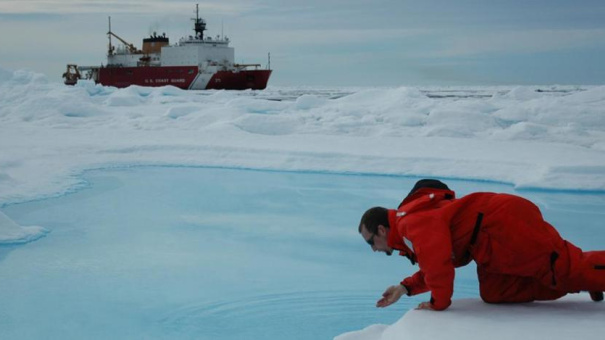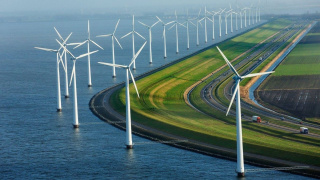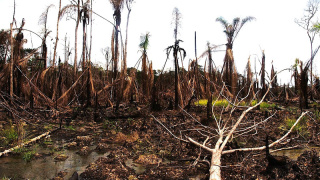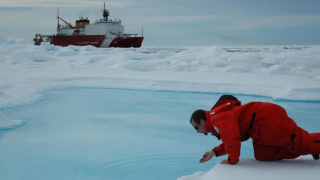The Environmental Scam: One Quick and Easy Response
Once you cut through their verbiage, the enemies of bourgeois civilisation have two demands. These are:
- Put me and my friends in charge of preferably a one-world government with total power over life and property; or, until then, or failing that,
- Give us a lot of money.
When I was younger, the occasion for making these demands was something to do with poverty or economic instability, and the alleged need was for a bigger welfare state, or state ownership of the means of production, or playing about with money to “move the aggregate supply curve to the right.” The nice thing about these claims and their alleged solutions was that they all had to be debated within the subject area of Economics. Because most of us knew a lot about Economics, we could always win the debates.
By the end of the 1980s, winning was so easy, the debates had become boring. Since then, the alleged need has shifted to saving the planet from some environmental catastrophe. The resulting debates are now harder to win because most of us are not that learned in the relevant sciences. Though I am more than competent in Economics, my main expertise is in Ancient History and the Classical Languages. Much the same is true for most of my friends.
Take, for example, the latest occasion for making the two demands stated above. This is that the sea is filling up with waste plastic, and that this looks horrid, and is being eaten by the creatures who live in the sea, and that they are all at risk of dying – and that this will be a terrible thing of all of us. For the solution, see Annie Leonard, writing in The Guardian: “Recycling alone will never stem the flow of plastics into our ocean. We must address the problem at the source.” You can take her last sentence as shorthand for the usual demands.
What response have I to this? Not much directly. Give me half an hour, and I will explain with practised ease that the Phillips Curve is at best a loose correlation between past variables, and that there is no stable trade-off between unemployment and inflation. But search me how most plastics are made, how long they take to degrade, or what harm they do if eaten.
A short search on the Web has brought up some useful information. There is, for example, an essay by Kip Hansen, published in 2015 – “An Ocean of Plastic.” He says, among much else:
- That the Great Garbage Patch said to be floating about the Pacific is a myth, and that the main alleged photographs of it were taken in Manila Bay after a storm had washed the rubbish out of the streets;
- That the amount of plastic waste floating in the sea is very small per cubic metre of water, and that it is invisible to the uninformed eye in the places where this Garbage patch is said to be floating;
- That plastic waste quickly breaks down into tiny chunks that are then eaten by bacteria, who are not harmed by it;
- That larger chunks eaten by fish and birds are easily handled by digestive systems that have evolved over many ages to cope with much worse than the occasional piece of polystyrene foam.
His conclusion:
The “floating rafts of plastic garbage”-version of the Great Pacific Garbage Patch is a pernicious myth that needs to be dispelled at every opportunity.
That really is all I need to know. Of course, however, it is not enough to win an argument. Put me up against someone whose job is to lecture the world on the horrors of plastic waste, and I shall do a very poor job. He will pour scorn on the response I have summarised. He will draw attention to other alleged facts, and support these with reams of official statistics collected I have no idea how. We shall be engaged not in a deductive argument about the science of human choice, but in an argument about facts that I am in no position to examine for myself, and about scientific claims that I am not remotely qualified to assess. What to do about that?
Here is my response. During the past half century or so, we have had one factual claim after another about the natural world. These include:
- The claim my English teacher repeated to me in 1974 about the coming exhaustion of mineral resources – that, for example, there would be no more gold to mine after 1984, and that the oil would run out shortly after or before then;
- The claim, made around 1986, that aids would, by 1990, have killed two million people in England alone;
- The claim, made in 1996, that, by 2006, a million people in England would have had their brains rotted by eating beef infected with Mad Cow Disease;
- The claims, made in the 1980s, that factory emissions were turning the rain to acid, and that this would do terrible things;
- The claims, made about the same time, that our refrigerators and air conditioning units had opened a hole in the ozone layer, and that we would all soon be cooked by radiation from the Sun;
- The claims, that I noticed in 1989, that areas of jungle the size of Belgium were being regularly cut down in the Amazon, and how this would be bad for us;
- The claims, made since about 1988, that our industrial civilisation as a whole was causing a rise in global temperatures.
I leave the last of these claims aside for the moment. What the others all have in common is that they involved predictions of substantial or total collapse unless the usual demands were met. These demands were not met, and the world carried on as normal. Gold and oil did not run out. I am not sure how many people have heard about the ozone hole. I am not sure if anyone now claims it is getting bigger, or is still there. Nothing substantial was ever done about acid rain, but the world has still not become a giant desert. None of my friends has died of aids, nor of Mad Cow disease. My South American students do not report that Brazil nowadays looks like the surface of the Moon.
I now turn to the claims about global warming. I will not discuss the intricacies of how much carbon dioxide we are releasing, or what effect this may have on temperatures. I leave aside the persistent claims of scientific fraud and other corruption. As said, I am not qualified to comment on these or other matters. What I do note is that, in 2006, Al Gore
[p]atiently, and surely for the 10,000th time, [explained to The Guardian] what’s going wrong. The atmosphere is like a coat of varnish around the globe, he says. When it’s thin, as it should be, heat naturally escapes. But when it gets thicker, thanks to carbon dioxide emitted by us, it traps in the heat and the world gets warmer. “It’s cooking and wilting the most vulnerable parts of the eco-system, melting all the mountain glaciers, the north polar ice cap, parts of Antarctica, parts of Greenland.” That molten ice-water will raise sea-levels, flooding food-producing areas that all of us rely on. Eventually it will submerge whole cities, from San Francisco to Shanghai. The site of the Twin Towers will not be a memorial garden: it will be underwater.
… He agrees with the scientists who say we have 10 years to act, before we cross a point of no return.
In 2009, the Prince of Wales – advised by the “leading environmentalists Jonathon Porritt and Tony Juniper” – said we had 96 months to change our ways. After that, we faced “irretrievable climate and ecosystem collapse, and all that goes with it.”
In 2005, George Monbiot wrote in The Guardian:
Winter is no longer the great grey longing of my childhood. The freezes this country suffered in 1982 and 1963 are – unless the Gulf Stream stops – unlikely to recur. Our summers will be long and warm. Across most of the upper northern hemisphere, climate change, so far, has been kind to us.
Ten years took us to 2016. Assuming my arithmetic is correct, 96 months take us to about now. If we have really reached the “point of no return,” why have these people not yet switched to telling us “I warned you: now it’s too late”? Instead, the apocalyptic warnings continue at top volume. Oh – and English weather remains as unpredictable today as it was in 2005. In March this year, there was an inch of snow in Deal.
The point of repeating these claims is that they were not random assertions, but appear to have been made on scientific advice – scientific advice that turned out to be wrong. Whether the scientists in question were lying, or whether they advised in good faith, is less important than that they were wrong. You do not need a degree in the natural sciences to notice when predictions are falsified. It is with this in mind that I take the present claims of plastic waste in the sea, and reject them out of hand. It may be that, this time, the claims are true. But the whole burden of proof is on those making them. The burden of proof comes with the barely-rebuttable presumption that we are being fed yet another diet of alarmist falsehoods.
My general view is that our planet is a vast treasure house of resources that, properly used, will take us to the stars. We shall colonise the inner planets, and mine the Asteroid Belt. We shall find cures for every illness and extend our lives. We shall uncover every remaining mystery of the natural world. During the past three centuries, much encouraging progress has been made. The curve is now turning almost vertical. It may be that, now and again, our scientific and technical progress throws up problems. If so, the solution is more scientific and technical progress. The only reasonable fear we should have is that the usual suspects will have their way, and return us to a past that I am fully qualified to describe, and that I assure you was horrible in every respect.











